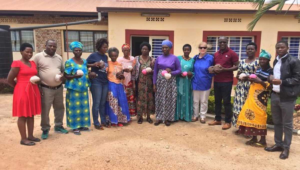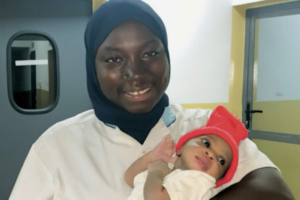Karamoja has faced intracommunal violence for decades, and as climate change exacerbates water scarcity, it’s getting worse. But vaccinator Sister Virginia Virgo is not backing down.
By John Agaba
First published September 18, 2024 by VaccinesWork

When Virginia Virgo packed her bags to join a monastery in northern Uganda in the 1980s, she had one thing in mind: to leave her past behind, and embrace a new life of prayer and contemplation. But she quickly realised that there were real-world problems she couldn’t simply leave behind – things like poverty, and the great numbers of children in her native Karamoja region who remained at risk from preventable disease. She decided to enrol in a nursing school after she made her vows.
Today, the Catholic nun has helped to vaccinate tens of thousands of children in the arid north-eastern region. She has vaccinated kids against meningitis, adults against COVID-19, young girls against HPV to protect them from cervical cancer and, more recently, jabbed infants between nine months and five years to thwart a measles outbreak in the region. She has screened children for tuberculosis, malaria and neglected tropical diseases (NTDs) like trachoma and schistosomiasis. She has treated the sick, fed malnourished kids, and dressed the wounds of the injured.

That work has required Sister Virgo to criss-cross great tracts of Karamoja, a region dogged for decades by conflict between nomadic herding tribes, and roiled by raiding cattle-rustlers. As climate change puts greater pressure on lives and livelihoods, the risk of violence appears to be accelerating – despite successive disarmament campaigns led by the Ugandan army. Spells of drought have seen watering holes used by the herdsmen for their animals shrink, or disappear entirely, fuelling resource competition. But Sister Virgo is undeterred.
“Lots of health workers don’t want to come here, but it is a risk someone has to take. Vaccines have helped us to stop some of the deadliest diseases including polio, tetanus and diphtheria, and are key towards improving the quality of life of children and of the next generation.”
– Sister Virginia Virgo, Karamoja
Mission of care
Virgo belongs to the missionary congregation of the evangelical sisters of Mary at St Kizito Naoi Parish in Karamoja. But Paul Kunsa, a programme officer who works on immunisation at PATH Uganda, estimates that she probably spends as much of her time in the wilderness, screening for diseases and vaccinating children, as she does at her monastery. “She is the in-charge at St Pius Kidepo Health Centre III. But rather than sit behind her desk, she is ever in the field tending to kids,” he said.
“Sister is committed to [vaccinating] children. Our health facility serves about 18 kraals including Poro, Nasolai and Lokisilei, that are far away towards the Kenyan border. But she will organise vaccination outreaches to each and every one of these kraals every month,” said Martha Loma, a colleague at St Pius Kidepo Health Centre III.
Dr Immaculate Ampeire, senior medical officer employed locally by the Ministry of Health, said Virgo supplemented the country’s efforts to extend vaccination services to “some of these hard-to-reach nomad populations that are ever on the move.”
“[The Ministry] has an ambitious target to vaccinate all zero-dose children in the country under the Equity Accelerator Fund and other programmes. Virgo and her team are supplementing this effort,” Dr Ampeire said.
Statistics for Moroto, the district that contains St Pius Kidepo Health Centre III, obtained from the Ministry of Health, speak to their success. Coverage of DPT1 – the first dose of the basic diphtheria, pertussis and tetanus-containing vaccine – has risen from 65% in 2020 to 80% today. Coverage of the first dose of the measles-rubella vaccine (MR1) has jumped from 62% to 78% over the same period. Vaccine drop-out rates have fallen from 16% to about 7%. But Virgo is just getting started.
“The target is to reduce zero-dose children even further, and reach every child,” said Virgo in an interview with VaccinesWork. “Lots of health workers don’t want to come here, but it is a risk someone has to take. Vaccines have helped us to stop some of the deadliest diseases including polio, tetanus and diphtheria, and are key towards improving the quality of life of children and of the next generation.”
Finding her vocation
Born in northern Uganda, Virgo gravitated towards vaccinating children when she joined the convent in Moroto, and witnessed how measles and other diseases disproportionately affected unvaccinated kids in the region.
After nursing school in 1994, she worked on a mobile clinic and moved around the greater Moroto region vaccinating children and treating villagers with minor infections. It is this mobile clinic that morphed into St Pius Kidepo Health Centre III.
“Lots of people here don’t really understand the importance of vaccines and will not bring their kids to health facilities for vaccination,” said the nun. “So, we have to go to them deep in the forests where they live with their livestock.”

From camp to camp
But going to them has its challenges. In the wetter season, the muddy forest roads can become impassable. Virgo recounts the times their 2001 Toyota Land Cruiser ambulance has gotten stuck in the mud and she and team have had to stop and haul it. She recounts incidents in which they have run into thick vegetation and have had to use machetes to cut their way out. There have been moments when they have had to abandon the car entirely and carry the vaccines to the kraals on their heads.
Then there are the times that Virgo and team have reached the kraals only to find the nomads have already moved on, in search of water and pasture, and they have to trek after the herdsmen. This can delay the team for days, at times weeks. Hostile encounters are also a perpetual risk, said the nun.
During outreaches, the team sets up camp at Kobebe, about 84 kilometres from Moroto town. That’s because the place is guarded by soldiers from the national army, who offer them protection. They camp here for usually a week, waking up every morning to head to the forest, visiting one kraal per day, and returning in the evening.
“Lots of people here don’t really understand the importance of vaccines and will not bring their kids to health facilities for vaccination. So, we have to go to them deep in the forests where they live with their livestock.”
– Sister Virginia Virgo, Karamoja
“We start with kraals that are nearby [to Kobebe] and proceed to those that are further away,” said Virgo. “We use kraal leaders and mega-speakers to mobilise the villagers. A typical kraal has between 50 and 100 members, so we visit them, and vaccinate kids and other young people who need to be vaccinated.”
After this, Virgo and her team – which usually includes nurses, midwives and lab technicians – screen the community members for malaria, tuberculosis and other NTDs. They treat villagers who test positive for malaria and refer serious TB cases to Moroto Referral Hospital. Apart from this, Virgo and her team administer dewormers to kids, offer antenatal services and dress wounds for the injured.

Risking violence
But the region can be hostile. Virgo remembers vividly when a group of thugs held her and her team at gun-point, at the height of the COVID-19 crisis in 2020. “They stopped us, searched us, but let us go when they found that we were only carrying drugs and vaccines,” she said.
“We have tried to befriend the Karimojong warriors, and at times we offer them lifts on our truck,” she said. “Many of the local people know us now. They know our ambulance, and that we are coming to help.”
But Virgo said that the health care system could achieve more if there were more clinics locally. “St Pius is the only health facility closest to the kraals,” she said. “It would be better if we had another health facility serving in the area – even if it were only a mobile clinic to help monitor unvaccinated children and the sick.”
She said they could also do with additional funding. “Vaccinating children in Karamoja can be tough, because very few health workers want to work here,” she said. “But it can be tougher when we have to borrow a vehicle because our old ambulance has broken down.”
Related Articles

Amid Brain Drain, Can Nigeria Draw Back Émigré Health Workers?
The high profile returns of some Nigerian medical specialists have sparked hopes that a sense of duty – together with opportunity in private practice – may help stem health sector exodus. From VaccinesWork.

“Then God sent Mr Balinda” – the Rwandan Nurse Supporting Cervical Cancer Patients
For patients, getting through cancer treatment is a trial. One nurse’s efforts to provide both material and emotional support has made a major difference. From VaccinesWork.

Celebrating the Vaccinators in Pictures
As the Expanded Programme on Immunization (EPI) turns 50, a new photo book celebrates the efforts of the diverse network of health workers who power it and sheds light on the challenges they face.
